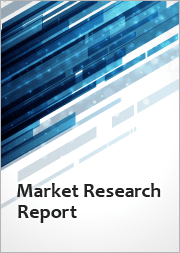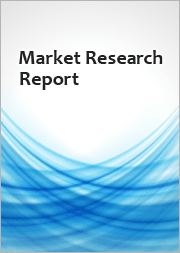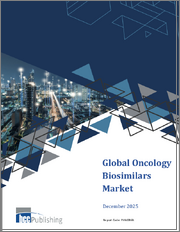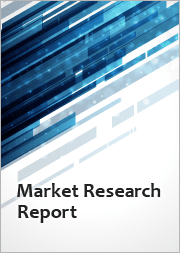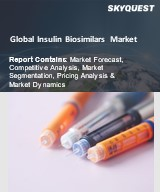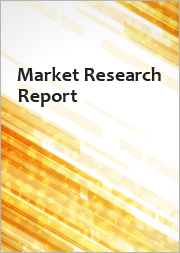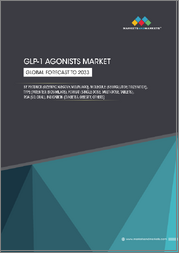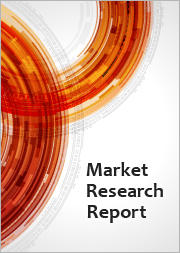
|
시장보고서
상품코드
1830976
종양학 바이오시밀러 시장Oncology Biosimilars Market |
||||||
세계 종양학 바이오시밀러 시장 규모는 2024년 106억 7,000만 달러로 평가되었고, 2031년에는 247억 1,000만 달러로 성장할 것으로 예상되며, 2025-2031년 12.8%의 연평균 복합 성장률(CAGR)을 보일 것으로 예측됩니다.
시장 인사이트와 애널리스트의 견해: 바이오시밀러는 기존 레퍼런스 생물학적 제제를 안전성, 유효성, 품질 측면에서 충실하게 모방한 바이오의약품이지만, 동일하지는 않습니다. 사용 가능한 바이오시밀러에는 단일클론항체, 필그라스팀, 페그필그라스팀, 에포에틴a, 에포에틴ζ와 같은 지지체가 있으며, 다양한 암 치료에 사용되고 있습니다. 암 발병률 증가, 바이오시밀러 의약품의 비용 효율성, 암 분야 바이오시밀러 승인 건수 증가 등의 요인이 이 시장을 주도하고 있습니다. 또한, 바이오시밀러와 임상시험에 대한 제조업체 간의 협력 관계는 향후 몇 년 동안 종양학 바이오시밀러 시장에 새로운 트렌드를 가져올 것으로 예측됩니다. 그러나 바이오시밀러의 제조에는 높은 제조비용과 복잡성이 수반되기 때문에 시장 성장에 걸림돌이 되고 있습니다.
종양학 바이오시밀러 시장 규모 및 점유율 - 시장 성장 촉진요인 : 세계보건기구(WHO)에 따르면, 2022년 전 세계적으로 약 2,000만 명의 신규 암 환자와 970만 명의 암 관련 사망자가 발생한 것으로 보고되었습니다. WHO의 Global Cancer Observatory의 최신 추정에 따르면, 2022년 10가지 암이 전 세계 신규 환자 수와 사망자 수의 약 2/3를 차지헀습니다. 폐암이 가장 많았으며, 250만 명이 새로 발병해 전체의 12.4%를 차지했습니다. 여성 유방암이 230만 건(11.6%)으로 그 뒤를 이었고, 대장암은 신규 발생 건수의 9.6%를 차지했습니다. 4위는 전립선암으로 150만 건, 5위는 위암으로 97만 건이었습니다. 보다 저렴한 가격의 암 치료용 바이오시밀러의 도입은 의료 비용을 절감하고 효과적인 암 치료에 대한 접근성을 강화할 수 있습니다. 예를 들어, MDPI(Multidisciplinary Digital Publishing Institute)가 2023년 7월에 발표한 연구에서는 암에 사용되는 바이오시밀러 단일클론항체(mAbs)의 안전성 프로파일을 참조용과 비교한 결과, 베바시주맙, 트라스투주맙, 리툭시주맙 베바시주맙, 트라스투주맙, 리툭시맙 등의 바이오시밀러와 오리지네이터 간의 안전성에 유의미한 차이가 없습니다는 결론을 내렸습니다. 이는 생물학적 제제의 오리지널 의약품을 대체할 수 있는 효과적인 대안으로 바이오시밀러의 사용을 지지하는 것입니다. 그 결과, 암 부담 증가와 사망률 증가로 인해 합리적인 가격의 치료 옵션이 필요하게 되었고, 이는 암 영역의 바이오시밀러 시장의 성장을 견인하고 있습니다.
전략적 인사이트
세분화 및 전망: '종양학 바이오시밀러 시장 분석 및 2030년 예측'은 주요 수익 포켓을 식별하는 데 도움이 되는 주요 동인, 미래 동향, 유리한 기회를 식별하는 데 도움이 되는 세계 시장 역학에 초점을 맞춘 심층적인 연구입니다. 이 보고서에서는 약제 유형별, 암 유형별, 유통 채널별로 세부적인 세분화를 통해 시장 개요를 소개했습니다. 또한, 주요 시장 기업에 대한 철저한 분석과 전략적 개척에 대한 내용도 수록되어 있습니다. 이 보고서의 조사 범위는 북미, 유럽, 아시아태평양, 중남미, 중동 및 아프리카 시장 실적 평가를 포함합니다.
약효군별 평가: 시장은 약효군별로 단일클론항체, 과립구 콜로니 자극인자, 적혈구 조혈자극인자(ESA)로 구분됩니다. 2023년 단일클론항체 부문은 종양학 바이오시밀러 시장에서 가장 큰 점유율을 차지했으며, 2023-2031년 연평균 성장률(CAGR)이 가장 높을 것으로 예측됩니다. 단일클론항체는 리간드 수용체 증식, 생존 경로 차단 등 다양한 기전을 통해 암세포를 제거할 수 있습니다. 주요 기전으로는 항체 의존성 세포독성(ADCC), 보체 매개 세포독성 등이 있습니다. 리툭시맙, 트라스투주맙, 베바시주맙은 2019년 12월 현재 유럽의약품청(EMA)과 미국 식품의약국(FDA)에서 암 치료제로 승인된 바이오시밀러 단일클론항체 중 하나입니다.
시장은 암종별로 대장암, 자궁경부암, 유방암, 지지요법, 림프종, 기타로 분류됩니다. 2023년에는 지지요법 부문이 가장 큰 시장 점유율을 차지했으며, 2023-2031년에는 대장암이 가장 높은 CAGR을 나타낼 것으로 예측됩니다. 세계보건기구(WHO)에 따르면, 암은 심각한 건강 문제이며, 전 세계 사망 원인 1위입니다. 암 발병률이 증가함에 따라 많은 암 분야 바이오시밀러 제조업체들이 신제품 개발 및 출시에 집중하고 있습니다. 예를 들어, 셀트리온의 CT-P16, 프레스티지바이오파마의 163 HD204, Cipla Biotech의 CBT124, Beijing Mabworks Biotech의 MIL60은 현재 임상 3상 시험 중인 베바시주맙의 바이오시밀러 후보물질로, 비소세포폐암 환자의 비소세포폐암 환자 치료에 대한 안전성과 유효성을 평가 중입니다.
시장은 유통 채널별로 원내약국, 소매 약국, 온라인 약국으로 구분됩니다. 2022년에는 병원 내 약국 부문이 가장 큰 시장 점유율을 차지할 것으로 예상되며, 온라인 약국 부문은 2023년부터 2031년까지 가장 높은 CAGR을 나타낼 것으로 예측됩니다. 병원 내 약국은 환자가 바이오시밀러를 포함한 처방약을 구매할 수 있는 주요 플랫폼 역할을 하고 있습니다.
수익 분석 : 수익 측면에서는 북미가 2023년 종양학 바이오시밀러 시장에서 가장 큰 점유율을 차지할 것으로 예상되며, 유럽이 그 뒤를 이을 것으로 예측됩니다. 암 발병률 증가, 암 치료용 바이오시밀러의 승인 확대, 첨단 의료 인프라가 예측 기간 동안 북미 종양학 바이오시밀러 시장을 견인할 것으로 예측됩니다.
암 환자 증가, 암 치료용 바이오시밀러 승인 증가, 선진화된 헬스케어 인프라는 북미 종양학 바이오시밀러 시장을 견인할 것으로 예측됩니다. 생물학적 제제는 미국에서 가장 비싼 의약품 중 하나이며, 바이오시밀러는 레퍼런스 제품보다 비용 효율성이 높을 것으로 예측됩니다. 2022년 10월 PubMed Central에 게재된 논문에서 2021년 6월 기준 미국 약가를 기준으로 생물학적 제제와 바이오시밀러의 단위당 평균 도매가격(AWP)을 분석한 결과, 바이오시밀러가 베바시주맙에 대해 15-23% 비용 절감 효과가 있는 것으로 나타났습니다. 절감할 수 있는 것으로 나타났습니다. 베바시주맙 바이오시밀러 중에서는 질베스가 오리지널 제품인 아바스틴에 비해 월등히 높은 비용절감 효과를 보이고 있습니다. 필그라스팀 바이오시밀러와 같은 지지적 암 치료제의 바이오시밀러는 레퍼런스 제품 대비 17.3%-34%, 페그필그라스팀 바이오시밀러는 33%-37%의 비용 절감 효과를 제공합니다. 페그필그라스팀 바이오시밀러의 경우 33%-37% 절약할 수 있습니다. 2022년 발행된 카디널 헬스 바이오시밀러 보고서에 따르면, FDA는 미국에서 33개의 바이오시밀러를 승인했고, 21개가 시판되고 있습니다. 보고서는 바이오시밀러가 2025년까지 미국의 의약품 지출을 1,330억 달러 절감할 수 있을 것으로 추정했습니다. 이처럼 바이오시밀러는 미국 내 생물학적 제제 비용을 낮추고, 환자들에게 보다 편리한 의료 서비스를 제공하며, 기술 혁신과 과학적 진보를 촉진할 수 있는 큰 잠재력을 가지고 있습니다.
종양학 바이오시밀러 시장 보고서 범위
산업 발전과 향후 기회: 종양학 바이오시밀러 시장 예측은 이해관계자의 성장 전략 수립에 도움이 될 것입니다. 다음은 종양학 바이오시밀러 시장의 주요 기업들의 주요 발전과 노력이다:
2022년 5월, 바이오콘 바이오로직스와 비아트리스는 캐나다 보건부로부터 4개 암에 대한 승인을 받은 로슈의 아바스틴(베바시주맙) 바이오시밀러인 아베이미를 출시했습니다.
2020년 4월, 화이자는 유럽연합 집행위원회(EC)로부터 특정 암을 적응증으로 하는 마더(리툭시맙)의 단일클론항체 바이오시밀러인 RUXIENCE의 승인을 받았습니다.
2020년 1월, 코러스바이오사이언스는 미국 및 캐나다에서 베바시주맙(아바스틴) 바이오시밀러의 개발 및 상업화를 위해 이노센츠 바이오로직스(Innocent Biologics, Inc.)와 라이선스 계약을 체결하였습니다.
경쟁 구도 및 주요 기업: 종양학 바이오시밀러 시장의 주요 기업으로는 CELLTRION, Inc, Teva Pharmaceutical Industries Ltd, Pfizer Inc, Sandoz Group AG, Biocon, Amgen Inc, Samsung Bioepis, Coherus BioSciences, BIOCAD, Lilly 등이 있습니다. 이들 기업은 하이테크 신제품 도입, 기존 기술 향상, 세계 소비자 수요 증가에 대응하기 위한 지리적 확장에 주력하고 있습니다.
목차
제1장 서론
제2장 주요 요약
- 주요 인사이트
- 시장 매력 분석
제3장 조사 방법
제4장 종양학 바이오시밀러 시장 구도
- PEST 분석
- 생태계 분석
- 밸류체인 벤더 리스트
제5장 종양학 바이오시밀러 시장 : 주요 시장 역학
- 주요 시장 성장 촉진요인
- 주요 시장 성장 억제요인
- 주요 시장 기회
- 향후 동향
- 성장 촉진요인과 억제요인의 영향 분석
제6장 종양학 바이오시밀러 시장 : 세계 시장 분석
- 세계의 종양학 바이오시밀러 시장 개요
- 세계의 종양학 바이오시밀러 시장과 2031년 예측
제7장 종양학 바이오시밀러 시장 - 매출 분석 : 약제 클래스별, 2021년-2031년
- 단일클론항체
- 적혈구 조혈 자극인자(ESA)
- 과립구 증식 촉진 당단백질(G-CSF)
제8장 종양학 바이오시밀러 시장 - 매출 분석 : 암 유형별, 2021년-2031년
- 대장암
- 자궁경부암
- 유방암
- 지지 요법
- 림프종
- 기타
제9장 종양학 바이오시밀러 시장 - 매출 분석 : 유통 채널별, 2021년-2031년
- 원내 약국
- 소매 약국
- 온라인 약국
제10장 종양학 바이오시밀러 시장 - 매출 분석 : 지역별, 2021년-2031년
- 북미
- 미국
- 캐나다
- 멕시코
- 유럽
- 독일
- 프랑스
- 이탈리아
- 스페인
- 영국
- 기타 유럽
- 아시아태평양
- 호주
- 중국
- 인도
- 일본
- 한국
- 기타 아시아태평양
- 중동 및 아프리카
- 남아프리카공화국
- 사우디아라비아
- 아랍에미리트(UAE)
- 기타 중동 및 아프리카
- 중남미
- 브라질
- 아르헨티나
- 기타 중남미
제11장 업계 상황
- 인수합병(M&A)
- 계약, 제휴 및 합작투자(JV)
- 신제품 출시
- 사업 확대와 기타 전략적 개발
제12장 경쟁 구도
- 주요 기업의 히트맵 분석
- 기업 포지셔닝과 집중도
제13장 종양학 바이오시밀러 시장 : 주요 기업 개요
- Biocon
- Celltrion Inc
- Samsung Bioepis
- Amgen Inc
- Coherus BioSciences
- Pfizer Inc
- Sandoz International GmbH(Novartis 부문)
- Teva Pharmaceutical Industries Ltd.
- Lilly
- BIOCAD
제14장 부록
LSH 25.10.27The oncology biosimilars market was valued at US$ 10.67 billion in 2024 and is expected to grow to US$ 24.71 billion by 2031, with a projected CAGR of 12.8% from 2025 to 2031.
Market Insights and Analyst View:Biosimilars are biopharmaceutical products that closely mimic existing reference biologic drugs in terms of safety, efficacy, and quality, though they are not identical. Available biosimilars include monoclonal antibodies and supportive agents like filgrastim, pegfilgrastim, epoetin a, and epoetin ζ, which are used to treat various cancers. The market is driven by factors such as an increase in cancer incidence, the cost-effectiveness of biosimilar drugs, and a rise in oncology biosimilar approvals. Furthermore, collaborations among manufacturers for biosimilars and clinical trials are expected to introduce new trends in the oncology biosimilars market in the coming years. However, high manufacturing costs and complexities in producing biosimilars pose challenges to market growth.
Oncology Biosimilars Market Size and Share - Market Drivers:According to the World Health Organization (WHO), approximately 20 million new cancer cases and 9.7 million cancer-related deaths were reported globally in 2022. The latest estimates from WHO's Global Cancer Observatory indicate that 10 different types of cancer accounted for about two-thirds of new cases and deaths worldwide in 2022. Lung cancer was the most prevalent, with 2.5 million new cases, representing 12.4% of the total. Female breast cancer followed with 2.3 million cases (11.6%), and colorectal cancer accounted for 9.6% of new cases. Prostate cancer and stomach cancer ranked fourth and fifth, with 1.5 million and 970,000 cases, respectively. The introduction of more affordable oncology biosimilars can alleviate healthcare costs and enhance access to effective cancer treatments due to their proven safety and efficacy in real-world settings, supported by clinical evidence and physicochemical quality data. For example, a study published by the Multidisciplinary Digital Publishing Institute (MDPI) in July 2023 compared the safety profiles of biosimilar monoclonal antibodies (mAbs) used in cancer with their reference counterparts, concluding that there were no significant differences in safety between biosimilars like bevacizumab, trastuzumab, and rituximab and their originators. This supports the use of biosimilars as viable alternatives to biologic originators. Consequently, the increasing cancer burden and rising mortality rates necessitate affordable treatment options, thereby driving the growth of the oncology biosimilars market.
Strategic Insights
Segmentation and Scope:The "Oncology Biosimilars Market Analysis and Forecast to 2030" is a detailed study focusing on global market dynamics to identify key drivers, future trends, and lucrative opportunities that can help pinpoint major revenue pockets. The report provides an overview of the market with detailed segmentation based on drug class, cancer type, and distribution channel. It also includes a thorough analysis of leading market players and their strategic developments. The scope of the oncology biosimilars market report encompasses an assessment of market performance across North America, Europe, Asia Pacific, South & Central America, and the Middle East & Africa.
Segmental Assessment:The market is segmented by drug class into monoclonal antibodies, granulocyte colony-stimulating factors, and erythropoiesis-stimulating agents (ESAs). In 2023, the monoclonal antibodies segment held the largest share of the oncology biosimilars market and is expected to register the highest CAGR from 2023 to 2031. Monoclonal antibodies can eliminate cancer cells through various mechanisms, including blocking ligand-receptor growth and survival pathways. Key mechanisms include antibody-dependent cellular cytotoxicity (ADCC) and complement-mediated cytotoxicity. Rituximab, Trastuzumab, and Bevacizumab are examples of biosimilar monoclonal antibodies approved by the European Medicines Agency (EMA) and the Food and Drug Administration (FDA) for cancer treatment as of December 2019.
The market is categorized by cancer type into colorectal cancer, cervical cancer, breast cancer, supportive care, lymphoma, and others. The supportive care segment held the largest market share in 2023, while colorectal cancer is projected to experience the highest CAGR from 2023 to 2031. According to WHO, cancer is a significant health issue and the leading cause of death globally. With the rising prevalence of cancer, many oncology biosimilar manufacturers are focused on developing and launching new products. For instance, CT-P16 by Celltrion, 163 HD204 by Prestige Biopharma, CBT124 by Cipla Biotech, and MIL60 by Beijing Mabworks Biotech are potential biosimilars of bevacizumab currently in phase 3 studies, being evaluated for safety and efficacy in treating patients with non-small cell lung cancer.
The market is segmented by distribution channel into hospital pharmacy, retail pharmacy, and online pharmacy. In 2022, the hospital pharmacy segment held the largest market share, while the online pharmacy segment is expected to register the highest CAGR from 2023 to 2031. Hospital pharmacies serve as the primary platform for patients to purchase prescription drugs, including biosimilars.
Regional Analysis:In terms of revenue, North America accounted for a significant share of the oncology biosimilars market in 2023, followed by Europe. The increasing incidence of cancer, growing approvals of biosimilars for cancer treatment, and advanced healthcare infrastructure are expected to drive the oncology biosimilars market in North America during the forecast period.
The rising cancer cases, increasing approvals of biosimilars for cancer treatment, and advanced healthcare infrastructure are anticipated to propel the oncology biosimilars market in North America. Biologics are among the most expensive medications in the US, and biosimilars are expected to be more cost-effective than their reference products. A cost comparison published in an article by PubMed Central in October 2022 analyzed the average wholesale price (AWP) per unit of biologics and biosimilars based on US drug prices as of June 2021, indicating that biosimilars could provide savings of 15-23% for bevacizumab. Among bevacizumab biosimilars, Zirbes offers significantly higher savings compared to the originator product, Avastin. Biosimilars for supportive cancer care agents, such as Filgrastim biosimilars, offer savings ranging from 17.3% to 34% compared to their reference products, while pegfilgrastim biosimilars provide savings from 33% to 37%. Additionally, Epogen biosimilars offer savings of 33.5%. According to the Cardinal Health Biosimilars Report published in 2022, the FDA has approved 33 biosimilars in the US, with 21 commercially available, 17 of which are used for cancer treatments. The same report estimates that biosimilars could reduce US drug expenditure by US$ 133 billion by 2025. Thus, biosimilars have significant potential to lower the costs of biologic medicines in the US, making care more accessible to patients and fostering innovations and scientific advancements, thereby driving the oncology biosimilars market in this region.
Oncology Biosimilars Market Report ScopeIndustry Developments and Future Opportunities:The oncology biosimilars market forecast can assist stakeholders in planning their growth strategies. Below are some key developments and initiatives undertaken by major players in the oncology biosimilars market:
In November 2022, Organon launched AYBINTIO, a biosimilar of Avastin, in Canada, aimed at patients with certain aggressive cancers, including metastatic colorectal cancer (mCRC), metastatic lung cancer, and glioblastoma, expanding the company's biosimilar portfolio.
In May 2022, Biocon Biologics and Viatris launched Abemy, a biosimilar to Roche's Avastin (Bevacizumab), which has been approved by Health Canada for four types of cancers.
In April 2020, Pfizer received approval from the European Commission (EC) for RUXIENCE, a monoclonal antibody biosimilar to Mather (rituximab), for treating certain cancers.
In January 2020, Chorus Biosciences entered into a licensing agreement with Innocents Biologics Co., Ltd. for the development and commercialization of a bevacizumab (Avastin) biosimilar in the US and Canada.
Competitive Landscape and Key Companies:Top players in the oncology biosimilars market include CELLTRION, Inc.; Teva Pharmaceutical Industries Ltd; Pfizer Inc; Sandoz Group AG; Biocon; Amgen Inc; Samsung Bioepis; Coherus BioSciences; BIOCAD; and Lilly. These companies focus on introducing new high-tech products, advancing existing technologies, and expanding geographically to meet the growing global consumer demand.
Table Of Contents
1. Introduction
- 1.1 Scope of the Study
- 1.2 Market Definition, Assumptions and Limitations
- 1.3 Market Segmentation
2. Executive Summary
- 2.1 Key Insights
- 2.2 Market Attractiveness Analysis
3. Research Methodology
4. Oncology Biosimilars Market Landscape
- 4.1 Overview
- 4.2 PEST Analysis
- 4.3 Ecosystem Analysis
- 4.3.1 List of Vendors in the Value Chain
5. Oncology Biosimilars Market - Key Market Dynamics
- 5.1 Key Market Drivers
- 5.2 Key Market Restraints
- 5.3 Key Market Opportunities
- 5.4 Future Trends
- 5.5 Impact Analysis of Drivers and Restraints
6. Oncology Biosimilars Market - Global Market Analysis
- 6.1 Oncology Biosimilars - Global Market Overview
- 6.2 Oncology Biosimilars - Global Market and Forecast to 2031
7. Oncology Biosimilars Market - Revenue Analysis (USD Million) - By Drug Class, 2021-2031
- 7.1 Overview
- 7.2 Monoclonal Antibodies
- 7.3 Erythropoiesis-Stimulating Agents
- 7.4 Granulocyte Colony-Stimulating Factor (G-CSF)
8. Oncology Biosimilars Market - Revenue Analysis (USD Million) - By Cancer Type, 2021-2031
- 8.1 Overview
- 8.2 Colorectal Cancer
- 8.3 Cervical Cancer
- 8.4 Breast Cancer
- 8.5 Supportive Care
- 8.6 Lymphoma
- 8.7 Others
9. Oncology Biosimilars Market - Revenue Analysis (USD Million) - By Distribution Channel , 2021-2031
- 9.1 Overview
- 9.2 Hospital Pharmacy
- 9.3 Retail Pharmacy
- 9.4 Online Pharmacy
10. Oncology Biosimilars Market - Revenue Analysis (USD Million), 2021-2031 - Geographical Analysis
- 10.1 North America
- 10.1.1 North America Oncology Biosimilars Market Overview
- 10.1.2 North America Oncology Biosimilars Market Revenue and Forecasts to 2031
- 10.1.3 North America Oncology Biosimilars Market Revenue and Forecasts and Analysis - By Drug Class
- 10.1.4 North America Oncology Biosimilars Market Revenue and Forecasts and Analysis - By Cancer Type
- 10.1.5 North America Oncology Biosimilars Market Revenue and Forecasts and Analysis - By Distribution Channel
- 10.1.6 North America Oncology Biosimilars Market Revenue and Forecasts and Analysis - By Countries
- 10.1.6.1 United States Oncology Biosimilars Market
- 10.1.6.1.1 United States Oncology Biosimilars Market, by Drug Class
- 10.1.6.1.2 United States Oncology Biosimilars Market, by Cancer Type
- 10.1.6.1.3 United States Oncology Biosimilars Market, by Distribution Channel
- 10.1.6.2 Canada Oncology Biosimilars Market
- 10.1.6.2.1 Canada Oncology Biosimilars Market, by Drug Class
- 10.1.6.2.2 Canada Oncology Biosimilars Market, by Cancer Type
- 10.1.6.2.3 Canada Oncology Biosimilars Market, by Distribution Channel
- 10.1.6.3 Mexico Oncology Biosimilars Market
- 10.1.6.3.1 Mexico Oncology Biosimilars Market, by Drug Class
- 10.1.6.3.2 Mexico Oncology Biosimilars Market, by Cancer Type
- 10.1.6.3.3 Mexico Oncology Biosimilars Market, by Distribution Channel
- 10.1.6.1 United States Oncology Biosimilars Market
- 10.2 Europe
- 10.2.1 Germany
- 10.2.2 France
- 10.2.3 Italy
- 10.2.4 Spain
- 10.2.5 United Kingdom
- 10.2.6 Rest of Europe
- 10.3 Asia-Pacific
- 10.3.1 Australia
- 10.3.2 China
- 10.3.3 India
- 10.3.4 Japan
- 10.3.5 South Korea
- 10.3.6 Rest of Asia-Pacific
- 10.4 Middle East and Africa
- 10.4.1 South Africa
- 10.4.2 Saudi Arabia
- 10.4.3 U.A.E
- 10.4.4 Rest of Middle East and Africa
- 10.5 South and Central America
- 10.5.1 Brazil
- 10.5.2 Argentina
- 10.5.3 Rest of South and Central America
11. Industry Landscape
- 11.1 Mergers and Acquisitions
- 11.2 Agreements, Collaborations, Joint Ventures
- 11.3 New Product Launches
- 11.4 Expansions and Other Strategic Developments
12. Competitive Landscape
- 12.1 Heat Map Analysis by Key Players
- 12.2 Company Positioning and Concentration
13. Oncology Biosimilars Market - Key Company Profiles
- 13.1 Biocon
- 13.1.1 Key Facts
- 13.1.2 Business Description
- 13.1.3 Products and Services
- 13.1.4 Financial Overview
- 13.1.5 SWOT Analysis
- 13.1.6 Key Developments
- 13.2 Celltrion Inc
- 13.3 Samsung Bioepis
- 13.4 Amgen Inc
- 13.5 Coherus BioSciences
- 13.6 Pfizer Inc
- 13.7 Sandoz International GmbH (A Novartis Division)
- 13.8 Teva Pharmaceutical Industries Ltd.
- 13.9 Lilly
- 13.10 BIOCAD
14. Appendix
- 14.1 Glossary
- 14.2 About The Insight Partners
- 14.3 Market Intelligence Cloud






